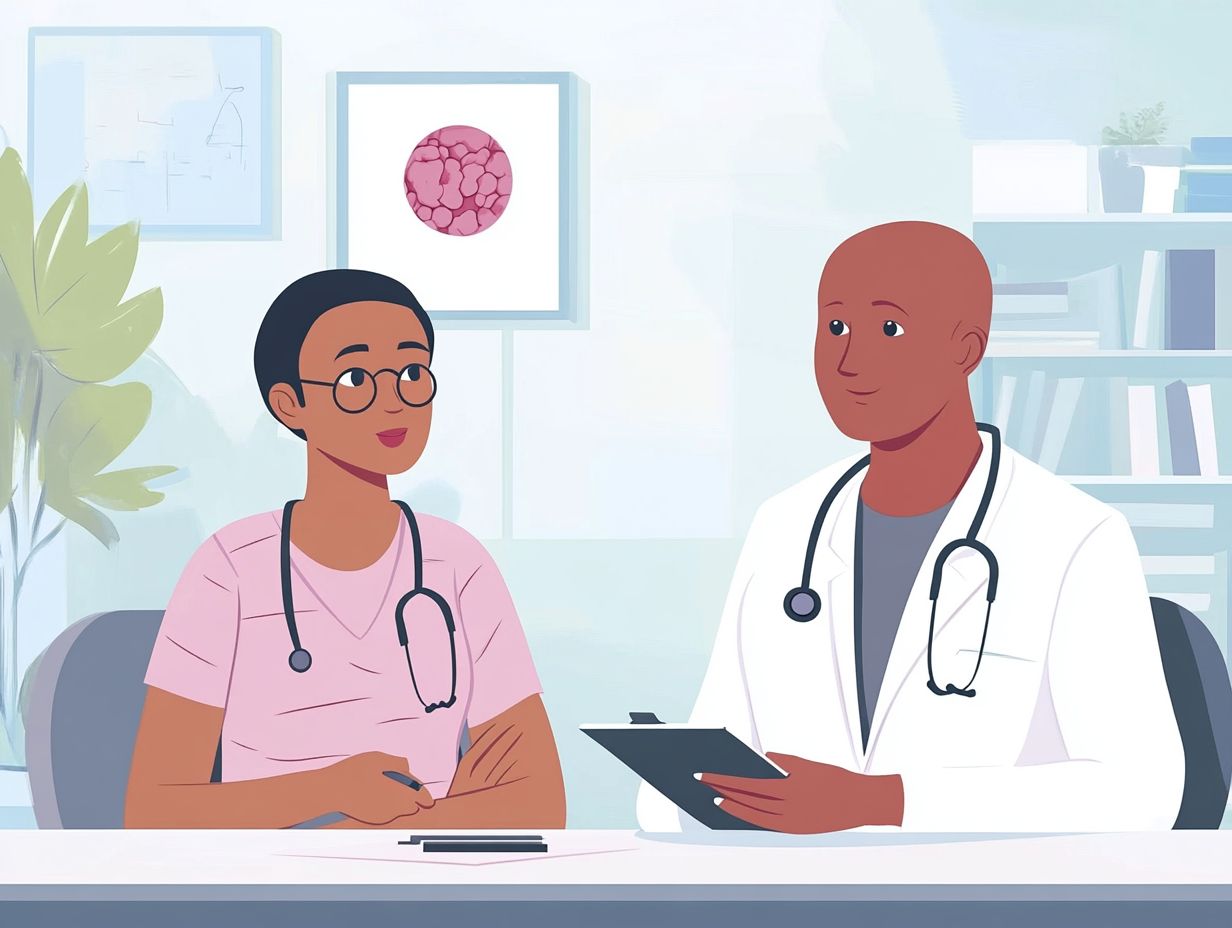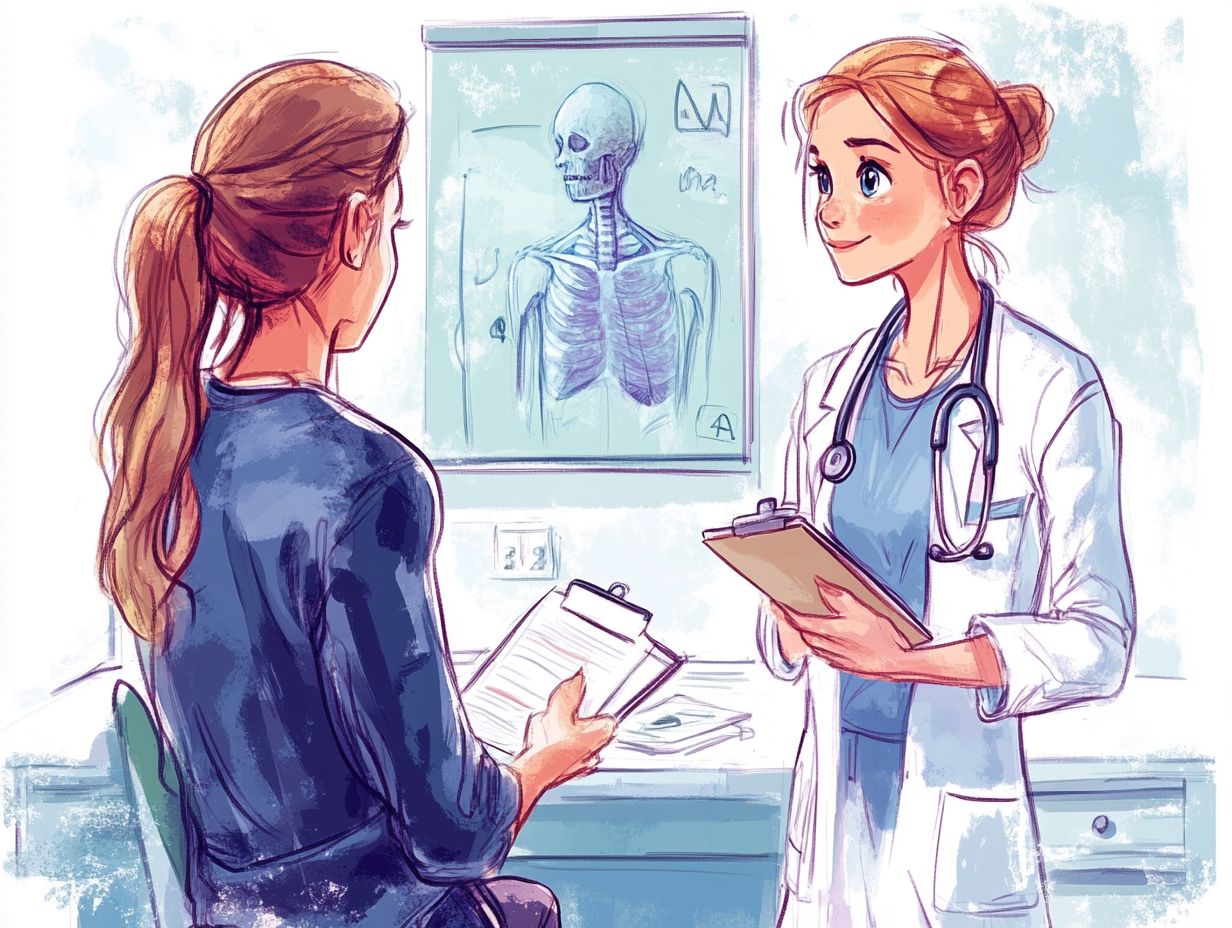Discussing your cancer history with new doctors is vital for ensuring effective healthcare management and personalized treatment. Sharing details about past cancer diagnoses and treatments helps doctors understand your medical history, enabling them to tailor treatment plans and enhance care quality. Oncology patients often benefit from this detailed exchange.
Open communication builds patient trust and satisfaction, while providing complete health information prevents ineffective therapies or harmful interactions. Properly preparing for these conversations involves gathering medical records, listing medications, and managing emotions to facilitate clear and comprehensive discussions. This practice is essential in both personal and impersonal settings, such as a physician office or an emergency room.
When meeting new doctors, it’s important to share detailed information, including your current diagnosis, previous treatments, current medications, and any relevant family medical history. This transparency allows healthcare providers to tailor future treatment plans accurately, reducing miscommunication risks.
Effective communication skills, such as active listening and honesty, enhance patient trust and make these discussions more productive, addressing potential concerns and stigmas related to cancer history. Utilizing a communication assessment tool can further improve these interactions.
Key Takeaways:
Importance of Discussing Cancer History with New Doctors

Discussing cancer history with new doctors is essential for effective healthcare management.
Sharing details about previous cancer diagnoses and treatments helps doctors understand the patient’s medical history, which is particularly important in oncology.
This information enables doctors to create tailored treatment plans and improve patient care quality.
Open discussions about cancer history increase patient trust and satisfaction.
Why it Matters for Your Health
Discussing your cancer history with new doctors is crucial for your health because it impacts treatment options and care quality.
Providing complete health information prevents ineffective therapies or harmful interactions.
Clear communication ensures doctors consider previous diagnoses, treatments, and side effects for personalized care.
Sharing your cancer diagnosis leads to more effective, personalized treatment options.
Preparing for the Conversation
Preparing for a conversation about cancer history with new doctors involves gathering medical records, listing medications, and noting any symptoms.
Patients should organize demographic details, including any relevant family history of cancer, and prepare questions for clarity and better communication. This may involve filling out a self-administered questionnaire or a consent form prior to the appointment.
Effective preparation ensures comprehensive discussions with healthcare providers and can significantly enhance patient satisfaction.
Gathering Relevant Information
Gathering relevant information, such as a cancer diagnosis and previous treatments, is essential for effective communication with new doctors. This can be done using tools like the Wake Forest Trust Scale to measure trust and satisfaction.
Preparation includes detailed medical records, treatment summaries, and documentation of side effects.
Documenting demographic details also influences treatment plans.
Organized information ensures productive discussions with doctors and aligns treatment goals.
Managing Emotions
Managing emotions is crucial when discussing cancer history with new doctors to ensure effective communication and patient satisfaction.
Patients can manage emotions by:
- Acknowledging feelings like anxiety and frustration,
- Preparing questions in advance, and
- Practicing grounding techniques like deep breathing.
Bringing a trusted companion for support can also help.
Emotional management enhances communication and improves the overall healthcare experience.
What to Share with New Doctors

When meeting new doctors, share detailed information about your medical history, including:
- Current cancer diagnosis and stage
- Previous treatments, such as chemotherapy, radiation, or surgery
- Current medications and dosages
- Existing health conditions and allergies
- Family medical history relevant to cancer
- Symptoms and side effects experienced
This information helps new doctors create an accurate and effective treatment plan.
Details of Previous Cancer Diagnosis and Treatment
Sharing details of previous cancer diagnoses and treatments with new doctors helps ensure personalized care. This includes discussing treatments like chemotherapy, radiation, or surgery, and any side effects experienced.
Provide key information such as:
- Past treatments
- Responses
- Side effects
- Any underlying health conditions
This transparency allows healthcare providers to tailor future treatment plans accurately and reduces miscommunication risks.
Current Health Concerns and Medications
Discussing current health concerns and medications with new doctors ensures accurate health assessments and safe treatment plans.
Sharing information about medications helps healthcare providers identify drug interactions and tailor treatments to individual needs. This is crucial for preventing harmful interactions and ensuring effective cancer care.
Clear communication about health concerns and medications improves treatment efficacy and patient satisfaction.
How to Approach the Discussion
Approach the discussion about your cancer history by being open and honest about your experiences and feelings.
Prepare specific points you want to discuss and prioritize them during the conversation.
Listen actively and respond to any questions or concerns directly.
Communicate your needs clearly and seek support if needed.
Communication Tips
Effective communication skills enhance patient trust and make discussions about cancer history more productive.
- Establishing rapport ensures patient comfort and facilitates deeper conversations.
- Asking open-ended questions encourages patients to share thoughts and feelings, providing essential information.
- Honesty and transparency foster a sense of safety.
- Active listening demonstrates genuine concern.
- Summarizing key points clarifies complex information.
- A collaborative approach give the power tos patients and includes them in their care journey.
Addressing Potential Concerns

Addressing potential concerns about sharing cancer history involves discussing any stigma openly, preparing responses for difficult questions, and ensuring clarity in communication with new doctors.
Patients can build trust by sharing concerns with healthcare providers and seeking support from patient advocacy resources.
Dealing with Stigma and Fear
Dealing with stigma and fear related to cancer history involves finding supportive environments and speaking openly about fears. Sharing survey responses from other oncology patients can help normalize these discussions.
Supportive environments include support groups, understanding friends, and community initiatives focused on cancer awareness. These can be facilitated by organizations such as the National Cancer Institute and National Institutes of Health, located in Bethesda, Maryland.
- Support groups
- Understanding friends
- Community initiatives focused on cancer awareness
Open communication about fears helps alleviate anxiety and encourages others to share their stories, improving healthcare outcomes and give the power toing individuals to seek medical support.
Handling Difficult Questions
Handling difficult questions from new doctors requires strong communication skills to enhance patient trust during discussions about cancer history.
Prepare by anticipating potential inquiries and understanding underlying concerns.
- Provide clear, concise answers and maintain transparency to build rapport.
- Exhibit confidence to reassure individuals and encourage ongoing dialogue.
Frequently Asked Questions
1.
How Can I Discuss My Cancer History with New Doctors?
Discussing your cancer history with new doctors is essential for ensuring you receive the best care possible. Whether it’s during a scheduled appointment with a primary care physician or in an emergency room visit, clear communication is key.
Discussing your cancer history with new doctors can feel overwhelming and intimidating. However, it is important to communicate this information to ensure you receive the best care possible. One way to approach this is by making a list of key points and important details about your cancer journey before your appointment.
2.
What should I include in my list when discussing my cancer history with new doctors?

When making your list, be sure to include the type and stage of cancer you were diagnosed with, the date of your diagnosis, any treatments you have undergone, and any current medications you are taking. It may also be helpful to include any side effects or complications you experienced during your treatment.
3.
How much detail should I go into when discussing my cancer history with new doctors?
You do not need to go into every single detail about your cancer journey, but it is important to provide enough information for your new doctors to understand your medical history. Be honest and open about your experiences, and do not hesitate to ask any questions or address any concerns you may have.
4.
What should I do if I am uncomfortable discussing my cancer history with new doctors?
It is completely understandable to feel uncomfortable or anxious when discussing your cancer history with new doctors. If you are having trouble communicating, try bringing a trusted friend or family member to your appointment for support. You can also ask your doctor for resources or support groups that can help you navigate these conversations.
5.
Do I need to disclose my cancer history to all new doctors?
Yes, disclosing your cancer history to all new doctors, including specialists such as a medical oncologist or a surgeon, ensures continuity of care and optimizes treatment outcomes. It’s also important during a change of physicians to provide a complete medical history.
Yes, it is important to disclose your cancer history to all new doctors, even if you are seeing them for a seemingly unrelated issue. Cancer and its treatments can have long-term effects on your health and may impact your current health concerns. By providing your medical history and discussing potential treatment options, your doctors can better understand your overall health and provide personalized care. This disclosure is vital in various settings, whether you are seeing a primary care physician, a medical oncologist, or visiting an emergency room.
6.
Is it normal to feel emotional when discussing my cancer history with new doctors, such as a medical oncologist or during a change of physicians?
Yes, it is completely normal to feel emotional when discussing your cancer history with new doctors, especially for oncology patients. It is important to take care of your mental and emotional well-being during this process. Consider reaching out to a therapist or support group to help you cope with any emotions that may arise. Additionally, effective communication skills from physicians can enhance patient satisfaction and trust, making the disclosure process smoother.





